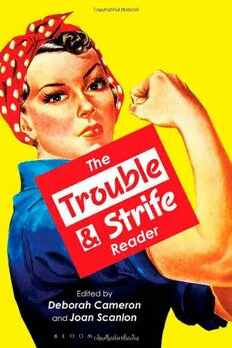
The Trouble and Strife Reader PDF
272 Pages·2010·3.076 MB·English
Most books are stored in the elastic cloud where traffic is expensive. For this reason, we have a limit on daily download.
Preview The Trouble and Strife Reader
Description:
From 1983 to 2002, Trouble and Strife: The Radical Feminist Magazine was a distinctive voice in British feminism. It was the longest-surviving completely independent feminist periodical published in this period and it combined the intellectual depth of an academic journal with the accessibility, topicality and visual appeal of commercial feminist magazines such as Everywoman and Spare Rib. Featuring articles by internationally prominent feminists including Julie Bindel, Deborah Cameron, Beatrix Campbell, Patricia Duncker, Liz Kelly and Diana Leonard, it represented a particular current in feminism, radical rather than liberal, materialist but not marxist, anti-essentialist but not postmodernist. It regularly challenged orthodoxies on controversial issues such as ritual abuse or the sexual politics of religious fundamentalism. This is a collection of the best and most enduring articles published in the magazine during its 20-year life. It offers a unique historical record of an important strand of radical feminist debate, enabling old readers to revisit it and new readers to discover it. Deborah Cameron is Rupert Murdoch Professor of Language and Communication at Worcester College, University of Oxford. She was one of the editors of Trouble and Strife magazine. Joan Scanlon taught at the London Contemporary Dance School and at the Open University for 15 years. She was also one of the original editors of Trouble and Strife. From 1983 to 2002, Trouble and Strife: The Radical Feminist Magazine was a distinctive voice in British feminism. It was the longest-surviving completely independent feminist periodical published in this period and it combined the intellectual depth of an academic journal with the accessibility, topicality and visual appeal of commercial feminist magazines such as Everywoman and Spare Rib. Featuring articles by internationally prominent feminists including Julie Bindel, Deborah Cameron, Beatrix Campbell, Patricia Duncker, Liz Kelly and Diana Leonard, it represented a particular current in feminism, radical rather than liberal, materialist but not marxist, anti-essentialist but not postmodernist. It regularly challenged orthodoxies on controversial issues such as ritual abuse or the sexual politics of religious fundamentalism. This is a collection of the best and most enduring articles published in the magazine during its 20-year life. It offers a unique historical record of an important strand of radical feminist debate, enabling old readers to revisit it and new readers to discover it. From 1983 to 2002, Trouble and Strife: The Radical Feminist Magazine was a distinctive voice in British feminism. It was the longest-surviving completely independent feminist periodical published in this period and it combined the intellectual depth of an academic journal with the accessibility, topicality and visual appeal of commercial feminist magazines. This is a collection of the best and most enduring articles published in the magazine during its 20-year life. It offers a unique historical record of an important strand of radical feminist debate, enabling old readers to revisit it and new readers to discover it.
See more
The list of books you might like
Most books are stored in the elastic cloud where traffic is expensive. For this reason, we have a limit on daily download.
